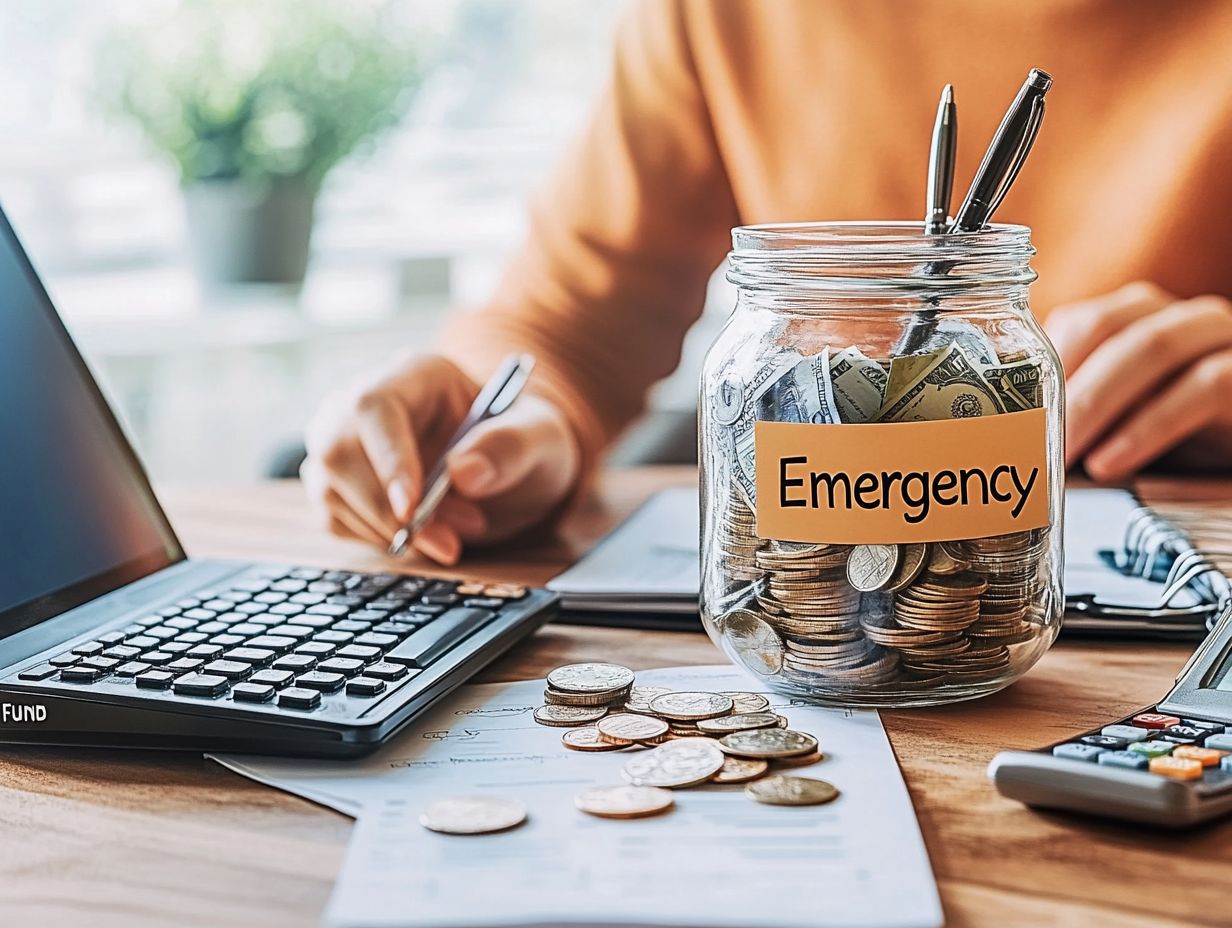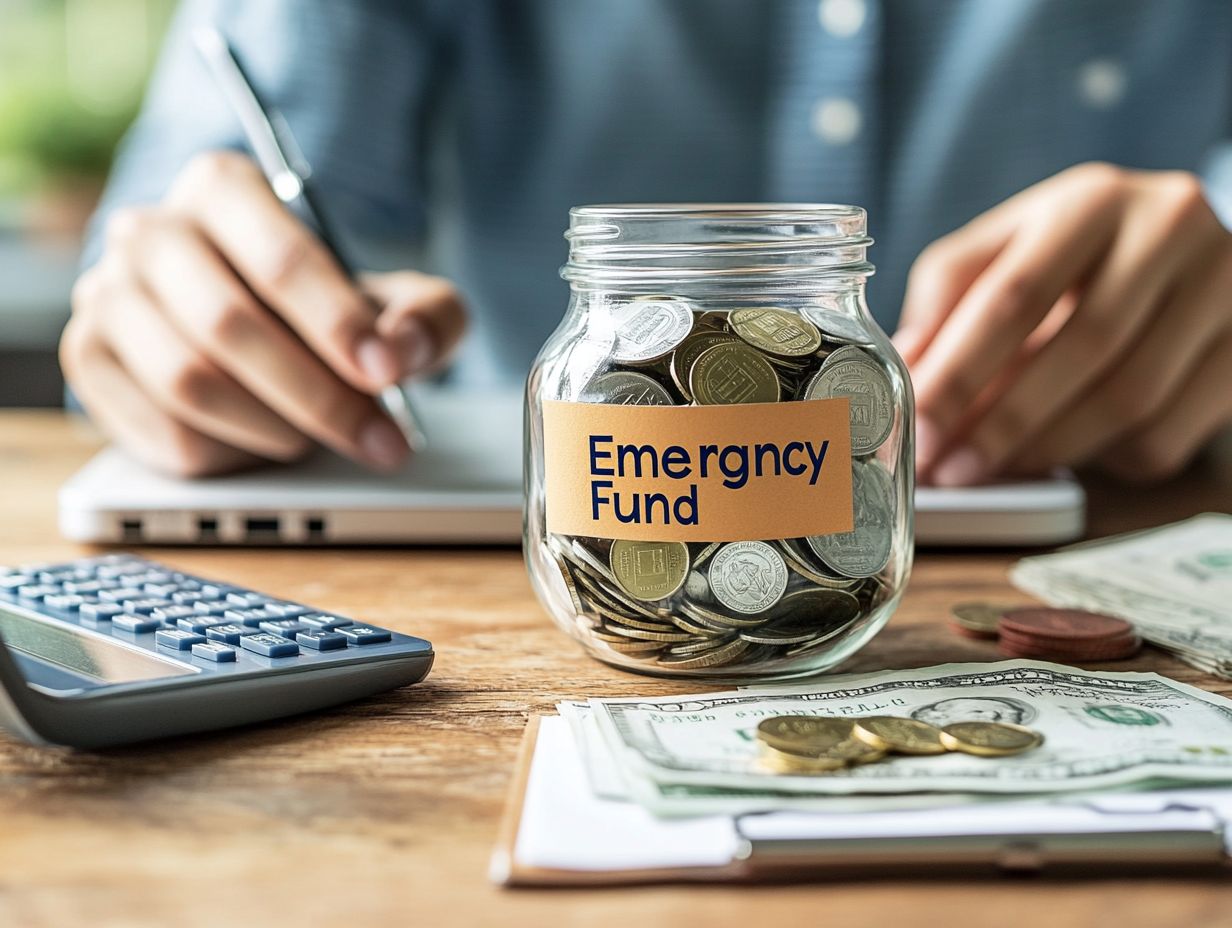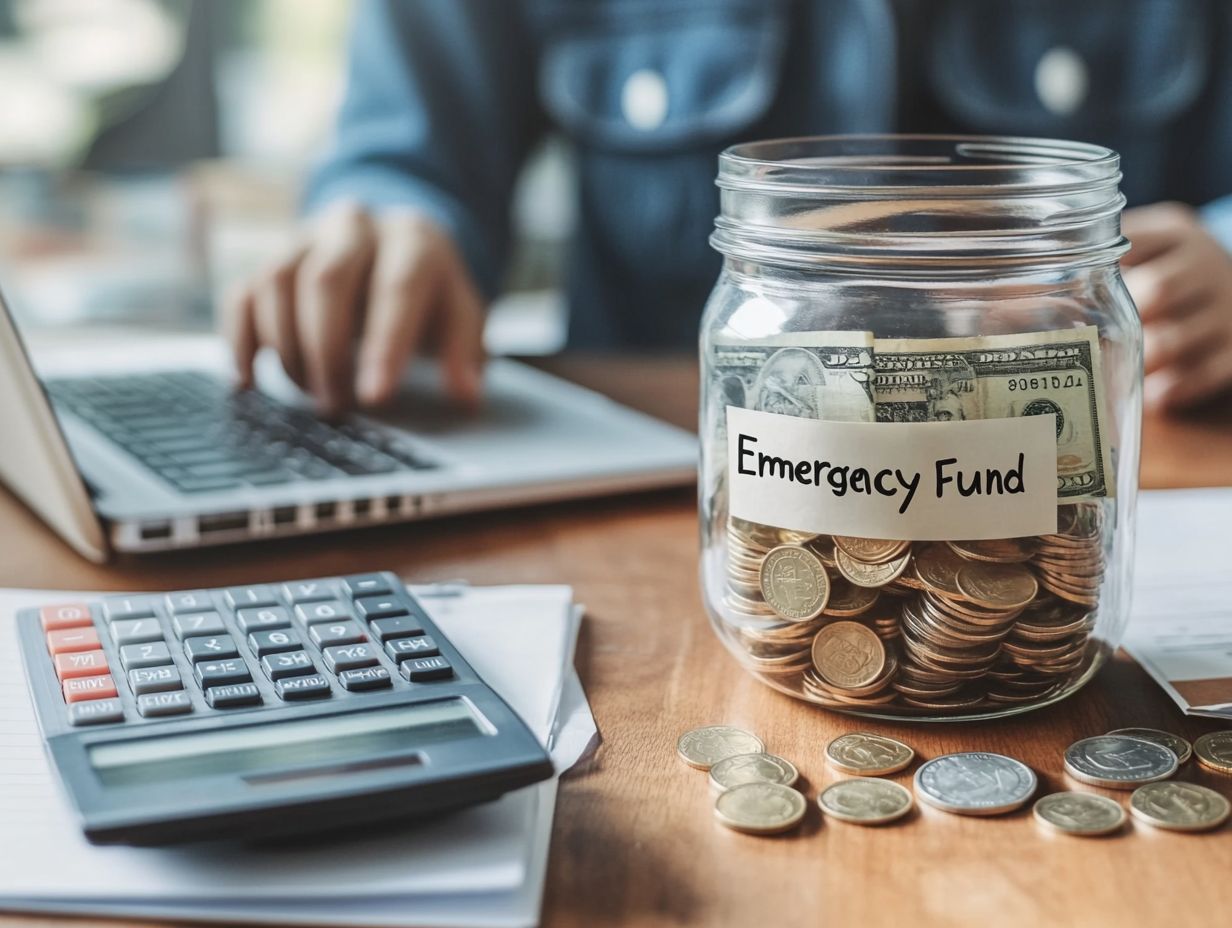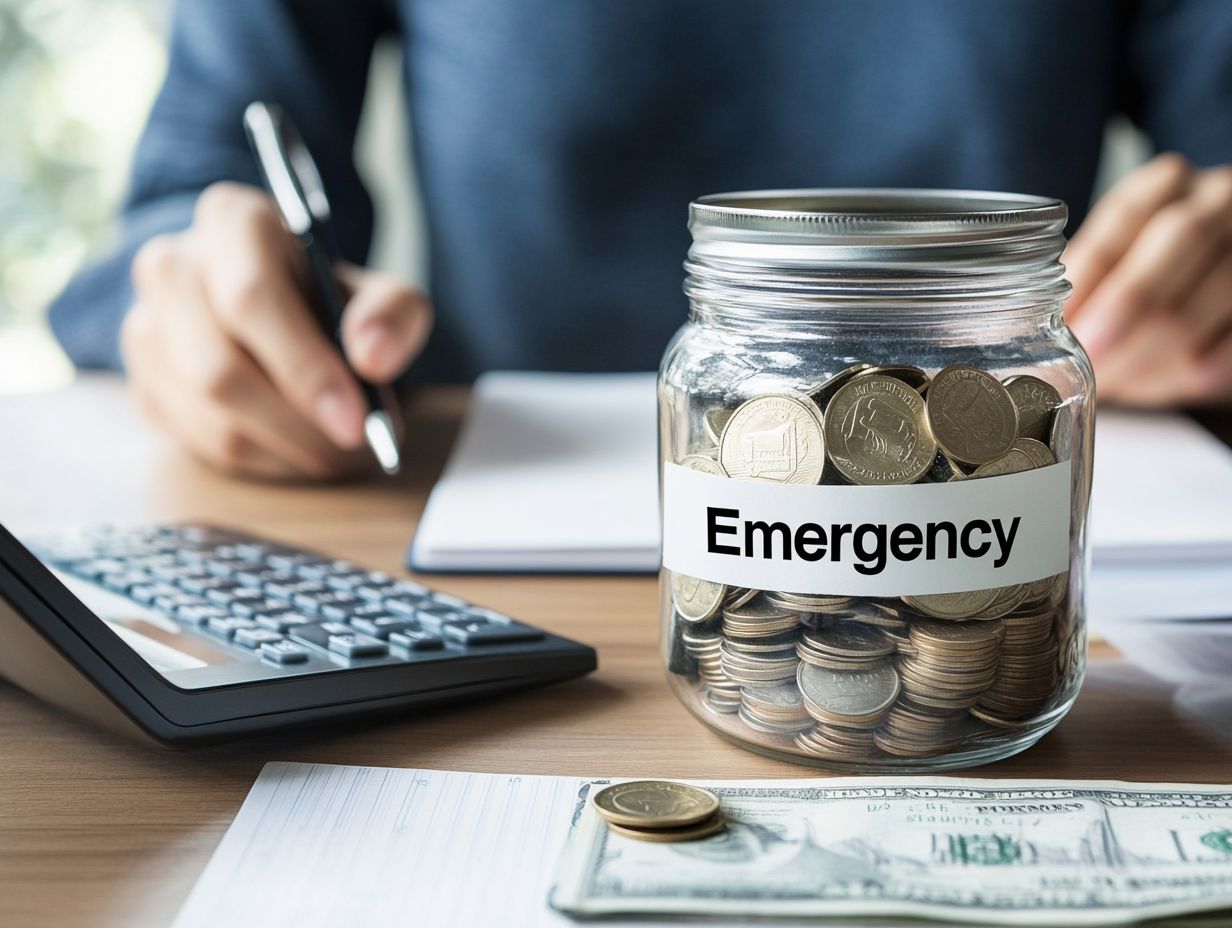How to Build an Emergency Fund with a Budget
In today s unpredictable world, establishing an emergency fund is crucial for achieving financial stability and ensuring peace of mind.
This guide delves into the significance of being financially prepared, providing you with a roadmap to create a budgeting tool tailored specifically for your emergency fund. Get ready to dive into exciting strategies to boost your savings!
You ll explore various topics, including effective strategies for saving money, selecting the right savings account, and tips to maintain your commitment to the budget.
By the end, you ll be equipped with a robust plan to protect your finances against life s unforeseen challenges, ensuring you are prepared for any unexpected costs.
Contents
- Key Takeaways:
- The Essential Reasons to Build Your Emergency Fund
- Creating a Budget for Your Emergency Fund
- Strategies for Saving Money
- Choosing the Right Savings Account
- Tips for Sticking to Your Budget
- Frequently Asked Questions
- What is an emergency fund and why is it important to build one?
- How much should I save in my emergency fund?
- How can I start building an emergency fund with a budgeting app?
- What are some tips for saving more money for my emergency fund?
- Do I need to have a separate account for my emergency fund?
- What should I do if I have to use my emergency fund?
Key Takeaways:

- Having an emergency fund provides financial security and peace of mind.
- Assess your income and expenses to determine a realistic budget for your emergency fund.
- Cut expenses, increase income, and choose the right savings account that allows easy access to your money to effectively save for emergencies.
The Essential Reasons to Build Your Emergency Fund
Establishing an emergency fund is an essential step toward achieving financial security and protecting against unexpected costs. It serves as a safety net against issues like medical bills, home repairs, or income volatility.
Ideally, your emergency fund should cover three to six months’ worth of living expenses. This creates a financial cushion that can significantly reduce anxiety during tough times. With this fund in place, you can manage your cash flow more effectively and make informed financial decisions without the need to turn to high-interest credit or personal loans. To learn more about building this fund, check out our guide on how to save for emergencies.
The Importance of Being Financially Ready
Being financially ready serves as the cornerstone of your financial well-being, enabling you to face unexpected income challenges and manage your overall financial health with grace.
By establishing a solid foundation of saving habits, you can effectively mitigate the risk of financial emergencies, ensuring that unexpected costs won’t disrupt your peace of mind. Cultivating a savings strategy that aligns with both your short-term and long-term goals gives you the power to approach your finances with confidence. Consider learning how to build an emergency income fund to further strengthen your financial security.
To enhance your financial literacy, consider engaging with resources such as workshops, online courses, or personal finance books recommended by the U.S. Bureau of Labor Statistics. These can provide you with the essential tools and knowledge you need. It’s crucial to confront financial anxiety head-on, recognizing that taking small contributions toward saving can significantly alleviate stress and promote a healthier relationship with money.
Creating a Budget for Your Emergency Fund
Establishing a budget tailored for your emergency fund is essential for fortifying your financial future and managing your monthly expenses. This approach enables you to designate precise amounts for savings contributions while skillfully managing your monthly expenses.
Assessing Your Income and Expenses

Assessing your income and expenses is an essential step in establishing a robust emergency fund. It provides crucial insight into your financial landscape and gives you the power to make informed financial decisions.
By closely examining your various income streams and household expenditures, you can pinpoint specific areas where trimming excess spending is possible. This approach not only clarifies which expenses are necessary versus discretionary but also opens the door to effective cash flow management techniques.
With an accurate budget in hand, delegating a portion of your income toward savings becomes much more manageable. Employing strategies like the 50/30/20 rule can enhance your budgeting practices, ensuring that a portion of your earnings consistently flows into an emergency savings plan, ultimately crafting a financial cushion for any unforeseen circumstances.
Don t wait! Start building your emergency fund now to secure your financial future.
Setting Realistic Goals
Setting realistic savings goals for your emergency fund is crucial for maintaining your financial stability and building good saving habits over time, especially during periods of income volatility.
Identify specific goals. This creates a clear path to your financial objectives. Align these goals with your current financial situation by considering your income and expenses. To develop an effective savings plan, assess your monthly expenses and determine a reasonable amount to set aside for your emergency fund. Additionally, learn how to prioritize savings in your budget. Regularly track your progress to boost your motivation; witnessing small milestones reinforces your commitment.
When you encounter changes in income or unexpected expenses, reassess and adjust your goals dynamically. This flexibility ensures that your targets remain realistic and attainable, allowing you to adapt based on changes in your cost of living.
Strategies for Saving Money
This approach helps you cut unnecessary expenses and opens doors to opportunities for increasing your income.
By implementing effective money-saving strategies, you can greatly enhance your capacity to build an emergency fund, making use of saving opportunities that arise.
Cutting Expenses and Increasing Income
Cutting expenses and increasing income are essential elements of any effective savings strategy, giving you the power to enhance your cash flow and strengthen your emergency fund.
By assessing your monthly subscriptions and evaluating household expenses, you may discover significant savings that can be redirected toward your financial goals. This might involve canceling unused memberships or negotiating better rates on services you actually use.
Along with trimming your expenditures, exploring side jobs like freelancing, tutoring, or diving into the gig economy can create an additional income stream.
Implementing these strategies supports effective debt management and paves the way toward achieving long-term financial peace, helping you feel more in control of your financial future and enhancing your financial well-being.
Choosing the Right Savings Account

Selecting the right savings account, especially an online bank, is essential for optimizing your emergency fund. It ensures that your liquid savings money that you can easily get to remain accessible while earning interest, helping you achieve your savings goals with confidence.
Features to Consider
When selecting a savings account, pay close attention to essential features like interest rates, fees, and accessibility. Recognizing the importance of these factors significantly influences how you manage your financial decisions.
For example, higher interest rates can substantially boost the growth of your funds over time, while low or nonexistent fees mean more money remains in your account.
Convenient access to your funds guarantees that unexpected expenses can be handled swiftly and without penalties. By striking the right balance between earning potential and easy access, you can transform your emergency fund from merely a safety net into a powerful tool for financial advancement and effective cash reserve management.
Tips for Sticking to Your Budget
Adhering to your budget is crucial for cultivating financial discipline and ensuring that you consistently make progress toward your savings goals, particularly when building your emergency fund.
Start your journey today! Take control of your financial future!
Overcoming Challenges and Staying Motivated
Building an emergency fund is not just important it’s essential! Take control of your finances and face uncertainties head-on. Overcoming challenges and staying motivated are key to building your emergency fund. This is especially true during times of financial anxiety.
You may often find yourself wrestling with unexpected costs, unclear savings goals, or the temptation to use your funds for non-essential purchases. These challenges can feel daunting. But with the right steps, you can overcome them!
It s important to break this process down into manageable steps. Set specific, achievable goals like saving a certain percentage of your paycheck each month through automatic transfers. This will provide clarity and direction to your efforts.
Celebrate small milestones, such as hitting that first $500 mark or utilizing your tax refund for savings. This reinforces positive habits and keeps your spirits elevated. This strategy not only fosters resilience but also enhances your sense of control over your finances. For more detailed advice, learn how to build an emergency fund, paving the way for a more secure financial future and improved financial well-being.
Frequently Asked Questions

What is an emergency fund and why is it important to build one?
An emergency fund is money set aside specifically for unexpected costs or financial issues. It is important to build an emergency fund to avoid going into debt or needing to use credit cards for emergencies, which can lead to high-interest rates on credit cards and more financial anxiety.
How much should I save in my emergency fund?
Financial experts recommend having at least three to six months’ worth of living expenses saved in an emergency fund. This can vary depending on your individual circumstances, but having a specific savings goal in mind can help you stay motivated to save.
How can I start building an emergency fund with a budgeting app?
The first step is to create a budget and track your expenses using a budgeting tool. This will give you a better understanding of where your money is going and where you can cut back to save for your emergency fund. Make sure to include a category for your emergency fund in your budget and set aside a specific amount each month.
What are some tips for saving more money for my emergency fund?
There are various ways to save more money for your emergency fund, such as cutting back on unnecessary expenses, finding ways to increase your income, and setting small achievable goals. Automating your savings helps you save consistently by setting up automatic transfers from your checking account to your emergency savings account each month.
Do I need to have a separate account for my emergency fund?
While it’s not necessary to have a separate account for your emergency fund, it can be helpful to keep it separate from your regular checking or savings account. This can prevent accidental dipping into your emergency savings for non-emergencies and help you stay disciplined with your savings habits.
What should I do if I have to use my emergency fund?
If you have to use your emergency fund for unexpected expenses, it’s important to replenish it as soon as possible. This may mean adjusting your budget and cutting back on household expenses in other areas. It’s also a good idea to review your emergency fund goal and ensure you are still on track to reach your financial stability.






